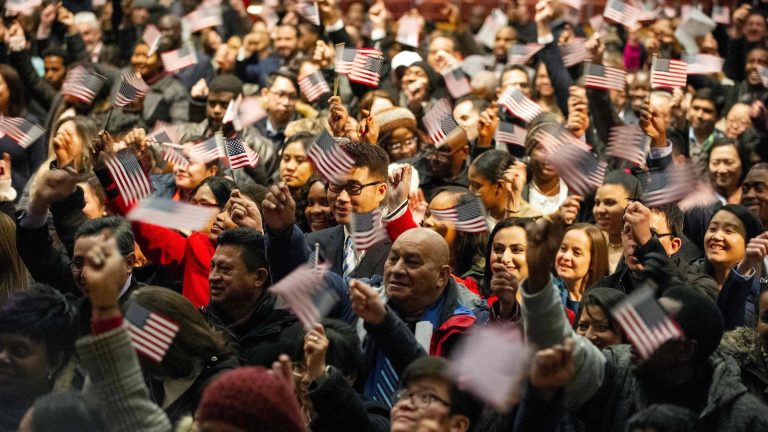Like clockwork, the aged speakers on the cement walls called in the school day, playing the same renditions of “This Land is Your Land” and “America the Beautiful” throughout the dimly lit hallways, the cramped bathrooms, and boisterous classrooms of my elementary school. The tinny renderings were practically a tradition—every day, at 9AM sharp. No one would pause or bat an eye at them. The students and teachers alike would treat them akin to the elevator muzak sprinkled atop an otherwise monotonous 9-5 commute, rather than as the rich stories they were intended to be. It’s been quite some time since those songs were first composed, and it seems like most Americans have forgotten them—but not all.
There are currently about 44 million immigrants in the United States; they come from far and wide, for economic opportunity and a chance at a better life. Since the dawn of the 20th Century, recessions, world wars, famines, and chaotic despots have all contributed to an influx of immigration into this land. People fled tyranny: lives of subservience under the rule of the few and powerful, in hopes of being in a country which saw them as human beings with inalienable rights—as people who deserved a new beginning.
It was this idea of the “American Dream” which enticed people like my family to take the leap and escape communism for a better life.
While the rest of Eastern Europe experienced revolutions against the Soviet yoke which were relatively peaceful and bloodless, Romania was not so lucky. Under the rule of Nicolae Ceausescu, the Romanian people suffered under ‘austerity’ policies, which sought to liquidate the national debt of $10B. As a result, food was rationed, malnutrition skyrocketed, and the people were left without basic goods, clothing, or even heat during the long winters. My parents remember the weekly breadlines, the power outages, and the ever-present black market tucked inconspicuously in back-alleyways, car trunks and grandmothers’ apartments.
For the most part, people suffered and were rendered mute by the Securitate who would ‘have talks’ with anyone who didn’t speak too kindly about the regime—they would come back with bruises and a couple of cracked ribs oftentimes. Civil liberties were a joke during these decades. Apart from the discrimination and violence perpetrated towards gypsy communities and foreigners, protesters were beaten, dissidents and the unemployed were jailed, and citizens were stripped of their identities: everyone was known as Tovarisch, or ‘comrade,’ nothing more and nothing less, in the eyes of the State.
The Romanian Revolution of 1989 led to the deaths of over 1,000 civilians. My father would recall how, during Ceausescu’s final speech to the people on December 21st, a panic erupted as onlookers heard what sounded like gunshots in the back of the crowd—they feared that the police were shooting at them for protesting.
In the West, we forget that once people are faced with proper tyranny, it is near impossible to oust it. My parents, and countless others who fled their homelands without knowing any English or having any family connections or employment prospects, decided to risk everything for a new opportunity in the United States. They saw the value of liberty, free from confinement, restriction, and oppression, and knew that that was attainable in America. Despite this apparent struggle, Americans all too often take their rights for granted.
I was privileged enough to be born in this country. Though I didn’t experience the food shortages, the political crackdowns, and the revolution first-hand, I carry my family’s history with me, and understand what can happen when people’s civil liberties are robbed from them. Yet, one cannot have liberty on its own. It must be fought for, preserved, and reinforced. The lessons of the past offer a blueprint for the future; they show what should be emulated, and what shouldn’t be repeated. Is this country perfect? Of course not. But it clearly has unique value, as tens of millions of immigrants from across the globe—from diverse cultures, traditions, and beliefs—call it their adopted home.
Liberty is not a promise, or a given. It’s more so a tree which must be cared for in order to prevent wilting and eventual death. Growing up around children from diverse immigrant backgrounds like mine taught me the importance of sharing this tree. The beauty of liberty is that it doesn’t discriminate. It is for all, no matter one’s circumstance. Instead of taking it for granted, we should celebrate our rights and privileges as Americans by ensuring that they are preserved for every citizen. The world is full of chaos and dictators, of rights abuses and violence. The concept of liberty gives hope to the hopeless, that one day they too may experience the freedoms Westerners presently hold. Understanding their plight from danger is the first step towards truly realizing what we have, preserving it for fellow Americans, and preventing the gradual slip into despotism seen in so many countries, just like the one my parents fled from.














Add comment